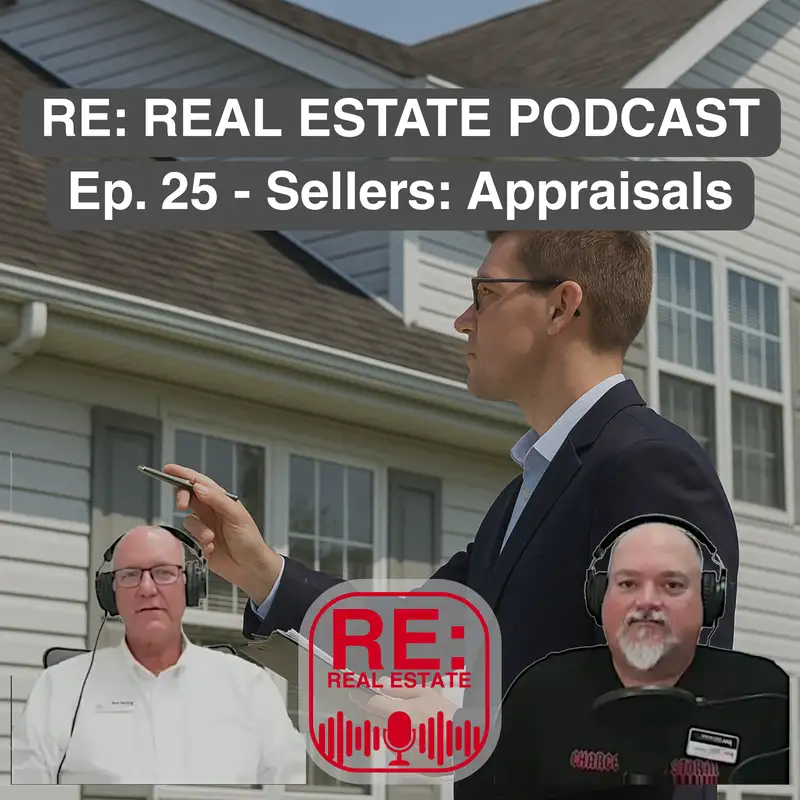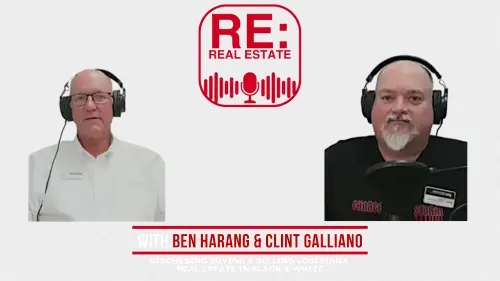Ep.25 - Sellers: Appraisals
Clint C. Galliano (00:29)
How you doing, Ben?
Ben Harang (00:31)
Hey Clint, I'm doing terrific, man. How you doing?
Clint C. Galliano (00:34)
I'm doing wonderful, What are we talking about today?
Ben Harang (00:38)
Well, on this gorgeous, sunshiny Wednesday afternoon, we talking about appraisals from the buyers. I'm sorry, from a seller's perspective. ⁓ yeah.
Clint C. Galliano (00:48)
Yeah, that's right. We talked about the buyers appraisal
already. Now we on sell a side.
Ben Harang (00:53)
Yes, we are. Um, first thing about the appraisal is making an offer contingent on the appraisal, which means if you want to buy a house for $200,000, the offer to buy it for $200,000 is contingent or conditioned on the appraisal coming in at at least $200,000. It only cuts one way. If it comes in below.
$200,000 the either either need to renegotiate the the offer or the deals over if it comes in above $200,000 the deal proceeds as it was written and accepted
Clint C. Galliano (01:41)
and that would be on homes that the buyer would be purchasing with financing.
Ben Harang (01:48)
True, true. Some, some people when they pay cash, want to, want to make it subject to an appraisal. That's not a good idea. ⁓ around Ida, got burned on somebody that apparently had a friend that was an appraiser and they tried to use the appraisal to buy the house for less than its value and it didn't work. so, but on a cash deal, it's really not a good idea to make it subject to an appraisal on a financed.
⁓ It has to be subject to the appraisal. So for the loan to happen, for the sale to proceed.
Clint C. Galliano (02:37)
They, ⁓ and I've done a deal or two where it a cash purchase and, the buyer wanted an appraisal and it was more of a kind of a feel good thing. ⁓ one of the things that's important to point out with a cash deal, the buyers, ⁓ they can bring in their choice of appraiser. Like you mentioned, they had a buddy that was an appraiser. ⁓
Ben Harang (02:49)
Mm-hmm.
Mm-hmm.
Clint C. Galliano (03:06)
With the finance deal, the buyer doesn't have control of who the appraiser is. It's kind of a jump ball thing as far as what appraiser gets the ⁓ appraisal request. So it kind of gives some protection that nobody's steering to an appraiser that gives them a good valuation based on their interests. So that's more of a...
Ben Harang (03:32)
Yeah.
Clint C. Galliano (03:35)
protection or was actually a protection on both sides because it's protecting the seller from not getting a low valuation just to give the buyer a better deal or the buyer from getting a high valuation just to give the seller a better deal.
Ben Harang (03:51)
Right. Now ⁓ that reminds me, I don't know if it's on our list of talking points, but once an appraisal is done on an FHA loan, whether the appraisal is good or bad, that's a matter of opinion, but the value of that appraisal and the conditions stay with that property for six months. So if the seller doesn't like the appraisal, they came back.
Just putting it back on the market to find another FHA buyer doesn't do any good because you still have the same appraisal. if the appraiser made a, just made a math error or a factual error or mismeasured something appraisers willing knowledge, if they made a mistake and fix it, sometimes it changes the value. Sometimes it doesn't. but once you get the appraisal in it's.
It's best to deal with the appraisal when he comes in and not just say, I'm going to just go find another buyer and get another appraiser on a conventional loan. You can do that. Um, on a government loan, not so much. So that's just something to keep in mind. If the appraisal comes back for less than the agreed upon price, it doesn't mean the appraisals bad. It just means the appraisal and the sales price do not match.
Clint C. Galliano (05:20)
And that's specific to FHA loans. know, other loans, that appraisal doesn't follow them from buyer to buyer, but in the case of FHA loans, it does because it retains that case number for either 120 days or 180 days. And I'm not quite clear.
Ben Harang (05:42)
I think it's 180,
think of six months. Um, and, and the reality is there are a whole lot of buyers out there that are FHA buyers and not conventional buyers. So, um, chances are if you go, if you have an FHA buyer, that the house is in the FHA price range. So you'll probably get another FHA buyer. So just, just be careful on, on, um,
On how you react to the appraisal. If, if you, if it's good for six months, you need to deal with it. If it's not good and it's a conventional deal and you want to put the house back on the market, that's certainly the seller's prerogative.
Clint C. Galliano (06:25)
And those are things that we advise on when we're working with sellers. And we help the sellers handle those on a case-by-case basis.
Ben Harang (06:35)
Right. Could you imagine Clint, you've been doing this for a minute. I've been doing this for 10 or 15 minutes now. and we still come across things that surprise us and a new to us. Could you imagine doing this once or twice in your lifetime and be knowledgeable enough to make the right decision to proceed and buy the house? that's like me doing my taxes. That's not going to happen. So anyway.
Clint C. Galliano (07:03)
Right?
Ben Harang (07:05)
It's just a thought.
Clint C. Galliano (07:10)
Yeah. So the appraisal is, I guess, kind of the third step in the process of selling your home from getting it listed, getting an offer. Well, maybe fourth step. Wow. Once it's under contract, you get a contract, you accept it.
Typically, the buyer and buyer's agent will want to get an inspection almost immediately, which we talked about. ⁓ And then the next step would be the appraisal. So go ahead.
Ben Harang (07:44)
Mm-hmm.
Well, as Joe Boudreau says, the inspection and appraisal ought to happen simultaneously. it's not a good idea to have the inspection done and then do the appraisal. if he, if it's done like that, the commitment on the buyer is not real strong. ⁓ understand that there's a problem with the house. You don't want to spend the money on the appraisal at the same time. But if you stack them one behind the other, it, it could literally delay the closing.
because the appraisal doesn't come in in a timely fashion. ⁓ and today's interest rates environments, the, way they're changing. If the appraisal didn't come back in a timely fashion, the buyer's interest rate lock may expire and the new rate would be higher. So it would have been cheaper to invest in the appraisal and inspection at the same time and keep the interest rate that you had locked in.
So I rather see the appraisal ordered on the front end and you can deal with the appraisal and the inspection. if you're going to, there's a problem with the inspection. You might be able get through the inspection and then you have another problem with the appraisal and the seller says, you know, I'm going to just put the house on the market. I'm not going do what I told you I was going to do. the appraisal is bad, I think. And I'm going to just put it back on the market.
rather than having them both done at the same time, you have a much better chance of working out the deal one time instead of renegotiating it twice, if that's what it takes.
Clint C. Galliano (09:29)
Well, and the other thing to add to that is that the longer you're delaying the closing, because you can mitigate where if you're starting to run out of time and if there's not a rate lock involved or if they're okay with extending the rate or the lender will cover the cost to extend the rate or what have you. As long as that's all of that's dealt with, there's always the chance that
What if the seller or the buyer loses their job? There is no fault of their own. They're no longer qualified to make a loan. what if in June's coming up, what if a hurricane comes through and damages the house? You know, and we're waiting on a extended closing date because it was decided. then granted as a seller on the seller side,
We don't have control over those options. Those are buyer decisions, you know, so we're kind of off on this tangent, but these are things we try and avoid. We try and make this happen as quickly as possible ⁓ to expedite our journey to closing. But those are things to keep in mind. know, the more timely our timeline, the better it is for everybody involved.
Ben Harang (10:55)
There's a saying that ⁓ I've come to appreciate recently that time kills deals. The longer it hangs out there, the less likely it is to close. So that's one of the things the Louisiana real estate commission's gone over the property disclosure and purchase agreement. That's going to be one of my suggestions that they put a timeline in the purchase agreement to order the appraisal.
We can't say the appraisal has to be done by a certain date, but it can be ordered and paid for by a certain date. ⁓ Just to kind of avoid those type of problems, they have to go back and get two bites at the apple. The first one's hard enough. The second one is really difficult. So it's easier to deal with both of them at the same time.
Clint C. Galliano (11:52)
And so we've talked about.
appraisal on the buy side and we're talking a little bit on details on the seller side. So I think it's a good idea to reiterate what the purpose of the appraisal is, ⁓ why we have to get an appraisal and what purpose serves during the purchase process or sale process in this case.
Ben Harang (12:20)
Okay, so you're gonna take that one or you want me to?
Clint C. Galliano (12:23)
Oh, why you go ahead and do that with you 10 or 15 minutes in the business.
Ben Harang (12:28)
okay. The appraisal is required by the lender, ⁓ not because they want to just, they want you to spend your money on an appraisal. It's required to make sure that the collateral they have for the loan that they're making you is sufficient to cover the loan in the case of foreclosure. Everything you sign when you buy a house on the mortgage favors the lender. None of it favors.
the buyer. And just like the purchase agreement used to be two pages when I got into business 15 minutes ago or 30 years ago, it's now 11 pages. The loan docs used to be maybe a half inch thick, now they might be three inches thick because every time there's a problem with a loan, they generate another piece of paper to try to prevent that from happening again. ⁓ So it's all, it's all about the collateral for the loan.
If they can't feel comfortable with the collateral, they're not going to make the loan. You're not going to buy the house. Just there's a ripple effect ⁓ that takes place if they're not making loans. So the government loans they want to make, the VA loans they want to make, but they want to make sure about the value of the collateral to cover the loan in the event of default.
So that's why we have to make the offer of the purchase agreement contingent on the appraisal. Cause if it doesn't appraise to justify the collateral, then they're not going to make the loan at the agreed upon sales price. Hopefully it makes sense Clint. ⁓
Clint C. Galliano (14:13)
It
does, ⁓ And a lot of it, you know, it kind of led me on a kind of a tangent about this majority of the transactions that we do, sales or ⁓ purchases, or based on at least where lending is involved, they're based on a percentage of the value
market value of the property that the loan is being made for. The government-sponsored entities guarantee that portion or a portion of the loan to the lender. So in the case of FHA loan, they'll guarantee 96.5 % of that loan. basically they're saying that the buyer only has to come up with 3.5 % down payment.
So that's a 96.5 % to 100 loan to value ratio. Rural development or USDA loan is 100 % loan to value, meaning that there's no equity in the property when they purchase. VA is the same way, but it's more of a benefit as a thank you for veterans for
what they've done for our country. So that's a slightly different story. And that's guaranteed by the Veterans Administration and not necessarily ⁓ a government-sponsored entity. And when you get into conventional loans, there's varying down payments involved. Most people think 20 % as the standard, but that's not always the case because it could be as low as 3%.
Ben Harang (15:51)
Yeah.
Clint C. Galliano (16:07)
But typically you'll see 5%, 10%, and sometimes up to 20 % on conventional loans.
Ben Harang (16:14)
And then it, and then that becomes a function of, uh, private mortgage insurance and whether you're to have it or not, uh, depending on the down payment amount. So just, uh, um, something else to keep in mind, uh, I dealt with foreclosed properties for 12 years, I think. And on a, on a day like today, the sun shining, the world is good. Um, the house is in.
Lawns manicured, the paint job is good. Um, everything about the house works today. Um, they concerned about the collateral sometime in the future, six months, five years, 15 years, however long it is, I guarantee you that house is not going to look the same as it looks today. So when people are arguing about the value of the house, um, it's like, it's really a.
don't know if misnomer is the right, right term because the value of the house today, if nothing else changes, if that house gets foreclosed on that value is going to be lower when it gets foreclosed on because the house is going to be in disrepair because people are losing the house. can't afford to maintain it. They can't afford to fix things. So by the time the bank gets the house in a foreclosure after the lawsuit and the share sale, and they send somebody in there for the first time, it's not anywhere near.
the house it was when it was financed and sold. So the appraisal on the front end, it might've been a $200,000 appraisal if that house is worth $100,000 in that current condition, it's probably a good thing. Not a good thing, it's probably optimistic. So when we talk about a house not appraising,
kind of take a step back and understand why it needs to be appraised and what happens if something goes into foreclosure. That appraisal is almost moot. It's almost like it didn't have to happen because the value of that house when it's foreclosed on is not going to be close to the appraised value. But that's just a tangent based on another 15 minutes in the foreclosure business.
Clint C. Galliano (18:40)
So I think probably the only other topic related to appraisals that we probably ought to touch on is what happens when as a seller, the appraisal comes in below what you're contracted to sell it for. That's never a good feeling when that happens. You've got a couple of options on what you can do. I'll let you go ahead and cover that, Ben.
Ben Harang (19:09)
Well, if the appraisal didn't come in, ⁓ if the appraisal is real, maybe the agreed upon sales price was not realistic. ⁓ Buyer might have been under pressure to agree to a price. ⁓ The reality is that in an increasing market, the appraiser is looking at historical data, so they consistently lag behind.
the market value in a decreasing market. They look in at higher comps and they typically are higher than the market. It's not their fault. It's just the way appraisals are done. But in my mind, the way to deal with the appraisal is deal with it. You know, it that's how much you can sell the house for today. If it's a $2,000 difference is one thing. If it's
25 or $50,000 difference, completely different conversation. But if it's ⁓ whether I'm on the buyer side or seller side, adjust the sales price and go to closing. Cause it's going to cost you more, more than that to hold onto the price, hold onto the property and maintain it until you find another buyer. the buyer may be incentivized for some reason to pay above the appraisal and come to closing with the additional cash between the
agreed upon sales price and appraised value. That's an option. So there's a little cat and mouse game. Who wants the deal to happen more, the buyer or the seller? ⁓ Because typically if it doesn't appraise, the seller sends the request to lower the value to the appraised value. The seller sees that, the buyer has to give them the appraisal to
Verify what it appraised for and sellers are typically not happy when that happens But at the end of the day for a couple of thousand dollars To be able to move on with your life. Go ahead and adjust the price if it's too much for you to to discount it You can do something in between or you may have to put the house back on the market even if it's an FHA appraisal and look for either a cash buyer or a conventional box
Clint C. Galliano (21:38)
Yeah, that kind of is what it is. ⁓ know, we can't run away from it. You just, you got to deal with it. And those are the options that you have. You know, and it's...
Ben Harang (21:41)
Right. You can't run away from it.
Yeah, and sometimes
the option is just keep the house. You know, if the difference is too great.
Clint C. Galliano (21:55)
Yeah.
That was an option.
Ben Harang (22:02)
So that house might be worth more to you than to anybody else in the world. And if you don't sell it, that means it is worth more to you.
Clint C. Galliano (22:03)
Alright.
Nope.
Alright, I think we've covered a bunch of ground related to appraisals and a few tangents.
Ben Harang (22:18)
And
a couple of tangents, I wasn't expecting that, but just kind of as we, as we go through this and, and, know, we, you and I laugh about it all the time. We just, we just two old guys in South Louisiana talking about the real estate business. ⁓ we, have our talking points to want to think we want to cover, but, ⁓ when we started talking about it, ⁓ we, we bring up, I guess, war stories, but that's where the experience comes from.
That's why we do what we do and that's why we do it how we do it So if if you get any value out of these podcasts ⁓ You can please share like The the podcast the available and Clint's the audio audio file on the on the video guy I like the video Clint likes the audio however you consume podcasts whether Spotify I heart Apple ⁓ I'm forgetting some of them
Pandora, I don't know. I don't guess Pandora, but YouTube. ⁓ however you get it, share it and like it. And, ⁓ we, we have a buyer series and a seller series. So depending on which side of the transaction you're on, take a look at it. ⁓ if you have a question, there's a, there's a site on the, there's a page on the website, rerealestatepodcast.com. Ask a question and we'll, we'll answer it in a future podcast. How did it sound Clint?
Clint C. Galliano (23:46)
Now,
that sounds pretty good. And if you go to the website also, ⁓ we've got the links to the audio podcast there. You can listen to them directly on the website. You can also find the link to the YouTube channel and go watch the videos of it directly from there without having to dig through YouTube to find it.
Ben Harang (24:08)
Yeah.
The best way to do it is go to rerealestatepodcast.com and click on a video podcast and it'll take you to the YouTube channel and there they are.
Clint C. Galliano (24:18)
And that's rerealestatepodcast.com. That's rerealestatepodcast.com. I said rerealestatepodcast.com.
Ben Harang (24:28)
Now what's the R-E stand for Clint? About in reference to it may also stand for real estate ⁓ like a double entendre if that's the
Clint C. Galliano (24:30)
About.
except I think it's triple this time.
Ben Harang (24:47)
Alright, I think they had enough listening to us watching us today, Clint. We're not stand-up comics. At least I know I'm not.
Clint C. Galliano (24:55)
Yeah, for sure, especially since I'm sitting down.
Ben Harang (24:57)
Yeah, well i'm standing up so All right clint enjoyed it. Have a good day. Y'all have a great week. we'll see you next time
Clint C. Galliano (25:07)
Yeah. See y'all.
Creators and Guests



